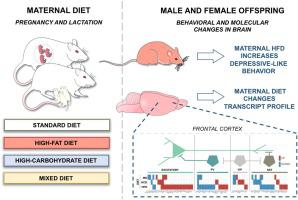Developmental Cognitive Neuroscience ( IF 4.7 ) Pub Date : 2020-11-10 , DOI: 10.1016/j.dcn.2020.100879 Kinga Gawlińska 1 , Dawid Gawliński 1 , Michał Korostyński 2 , Małgorzata Borczyk 2 , Małgorzata Frankowska 1 , Marcin Piechota 2 , Małgorzata Filip 1 , Edmund Przegaliński 1

|
Environmental factors such as maternal diet, determine the pathologies that appear early in life and can persist in adulthood. Maternally modified diets provided through pregnancy and lactation increase the predisposition of offspring to the development of many diseases, including obesity, diabetes, and neurodevelopmental and mental disorders such as depression. Fetal and early postnatal development are sensitive periods in the offspring’s life in which maternal nutrition influences epigenetic modifications, which results in changes in gene expression and affects molecular phenotype. This study aimed to evaluate the impact of maternal modified types of diet, including a high-fat diet (HFD), high-carbohydrate diet (HCD) and mixed diet (MD) during pregnancy and lactation on phenotypic changes in rat offspring with respect to anhedonia, depressive- and anxiety-like behavior, memory impairment, and gene expression profile in the frontal cortex. Behavioral results indicate that maternal HFD provokes depressive-like behavior and molecular findings showed that HFD leads to persistent transcriptomics alterations. Moreover, a HFD significantly influences the expression of neuronal markers specific to excitatory and inhibitory cortical neurons. Collectively, these experiments highlight the complexity of the impact of maternal modified diet during fetal programming. Undoubtedly, maternal HFD affects brain development and our findings suggest that nutrition exerts significant changes in brain function that may be associated with depression.
中文翻译:

母体饮食模式与大鼠后代对抑郁样表型的易感性有关
母亲饮食等环境因素决定了生命早期出现并可能持续到成年期的病症。通过怀孕和哺乳期提供的母亲改良饮食会增加后代患许多疾病的倾向,包括肥胖、糖尿病、神经发育和精神障碍,如抑郁症。胎儿和出生后早期发育是后代生命中的敏感时期,在此期间母体营养会影响表观遗传修饰,从而导致基因表达的变化并影响分子表型。本研究旨在评估母体改良饮食类型,包括妊娠和哺乳期间的高脂肪饮食 (HFD)、高碳水化合物饮食 (HCD) 和混合饮食 (MD) 对大鼠后代表型变化的影响。快感缺失,额叶皮层的抑郁和焦虑样行为、记忆障碍和基因表达谱。行为结果表明母体 HFD 会引发抑郁样行为,分子研究结果表明 HFD 会导致持续的转录组学改变。此外,HFD 显着影响特定于兴奋性和抑制性皮层神经元的神经元标记的表达。总的来说,这些实验强调了在胎儿编程期间母体改良饮食影响的复杂性。毫无疑问,母体 HFD 会影响大脑发育,我们的研究结果表明,营养会对大脑功能产生显着变化,这可能与抑郁症有关。行为结果表明母体 HFD 会引发抑郁样行为,分子研究结果表明 HFD 会导致持续的转录组学改变。此外,HFD 显着影响特定于兴奋性和抑制性皮层神经元的神经元标记的表达。总的来说,这些实验强调了在胎儿编程期间母体改良饮食影响的复杂性。毫无疑问,母体 HFD 会影响大脑发育,我们的研究结果表明,营养会对大脑功能产生显着变化,这可能与抑郁症有关。行为结果表明母体 HFD 会引发抑郁样行为,分子研究结果表明 HFD 会导致持续的转录组学改变。此外,HFD 显着影响特定于兴奋性和抑制性皮层神经元的神经元标记的表达。总的来说,这些实验强调了在胎儿编程期间母体改良饮食影响的复杂性。毫无疑问,母体 HFD 会影响大脑发育,我们的研究结果表明,营养会对大脑功能产生显着变化,这可能与抑郁症有关。这些实验强调了在胎儿编程过程中母亲改变饮食的影响的复杂性。毫无疑问,母体 HFD 会影响大脑发育,我们的研究结果表明,营养会对大脑功能产生显着变化,这可能与抑郁症有关。这些实验强调了在胎儿编程过程中母亲改变饮食的影响的复杂性。毫无疑问,母体 HFD 会影响大脑发育,我们的研究结果表明,营养会对大脑功能产生显着变化,这可能与抑郁症有关。



























 京公网安备 11010802027423号
京公网安备 11010802027423号